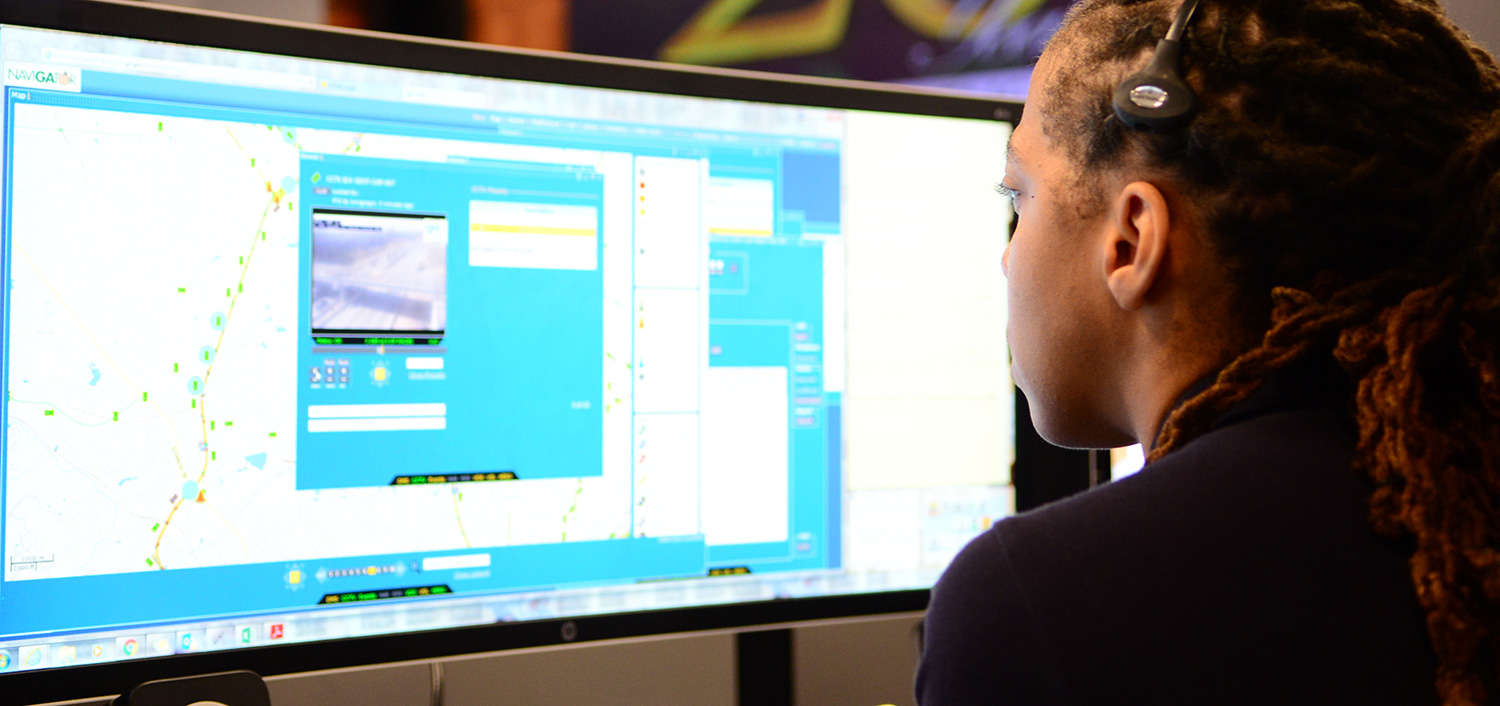GDOT Plan Calls For Fiber-Optic Cables, Cell Poles Along Highway

A 511 traffic operator in Atlanta monitors traffic in Georgia.
Courtesy of GDOT
Georgia’s Department of Transportation (GDOT) is trying to get broadband and wireless companies to install equipment along the state’s highways and interstates.
GDOT depends on cameras and message boards in rural parts of the state.
But during Hurricane Irma last month, many of them went down when the internet connections failed.
Broadband & Wireless Initiative
So GDOT is looking for private investors to install fiber-optic cables along interstates and set up small 5G cellphone poles along state roads.
“This will provide us the opportunity to have better coverage, from the angle of managing the traffic,” said GDOT operations director John Hibbard.
Hibbard said more than a dozen internet providers have shown interest in the “private-public partnership”.
“This is a neat idea because through it, we think that we can do a lot to bring broadband to a lot of rural Georgia specifically,” Hibbard said. “We have the ability now to put the fiber-optic cables along the interstates through this arrangement. That will get fiber-optic cable much closer to the overwhelming majority of Georgians and it will also allow us to expand our [511 Navigator] traffic management coverage statewide.”
Connecting Rural Georgia
Hotwire Communications Vice President of Corporate Development & Government, Jonathan Bullock, said he’s not sure many companies will bite without a significant subsidy from the state.
“Running fiber down a long highway is easy because you’re just going down a straight line,” Bullock said. “But when you’re moving into a town or neighborhood, you’ve got to deal with more traffic, stoplights, turns, curves, private right-of-way, since not all access is public. You’ve got people who own the right to the property and you have to negotiate with them for access to put your fiber there. You’ve got a lot more turns and curves and things like that.”
Bullock’s company offers internet, cable and phone service. He said connecting a rural home with fiber costs an average of $2,000 and is more costly and labor-intensive than putting fiber along the highway.
“With about 1.8 million people in Georgia living in rural areas, assuming that translates into 750,000 homes, then you are needing billions to connect rural communities,” Bullock said.
The plan wouldn’t likely reach the center of many rural areas, unless providers decide to expand into neighborhoods.
Ware County
Carlos Nelson, the District 1 Commissioner of Ware County in south Georgia, owns Nelson Photography & Graphics Design in Waycross.
“We really, really need broadband and wireless connection in rural Georgia. Real bad. Really bad,” Nelson said. “In order to have a business in the 21st century, you need an internet connection. That would help our growth, recruiting new industries. We need better connection to get 21st-century jobs.”
He said the county has three internet options: a cable company internet called VyVe, which does not reach rural residents, AT&T Broadband and a local provider called ATC Broadband.
He said he doesn’t think GDOT’s plan will immediately help Ware County since there’s no interstate running through it and the average range of a small cell is usually only 100-300 feet. These small cellphone poles also require a fiber connection for connectivity.
“Anything will help and is a great start but they will not have a major impact. I could look at this maybe, hopefully being a start to get something to the rural citizens,” Nelson said. “Hopefully it’s a trial that can be improved later.”
GDOT said the plan has Gov. Nathan Deal’s support, and it plans to review bids starting next year.








